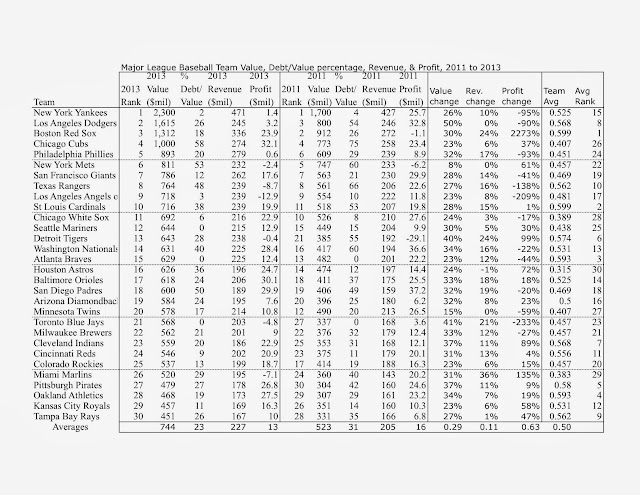Important Baseball Statistics - End of Regular Season
A few months ago, I wrote about the most important unspoken baseball statistic, money. Here we are at the end of the regular MLB season. The division winners and wild card teams are listed below.
Boston Red Sox (3)
Detroit Tigers (13)
Oakland Athletics (28)
Atlanta Braves (15)
St. Louis Cardinals (10)
Los Angeles Dodgers (2)
Tampa Bay Rays (30)
Cleveland Indians (23)
Pittsburgh Pirates (27)
Cincinnati Reds (24)
I was sorta sneaky. I put numbers beside each team without telling the reader what they represent. In the table below, I ranked teams by their value as estimated by Forbes Magazine at the beginning of the season. The numbers above are the teams' rank in terms of team value, a combination of the team revenue, home city and market size, stadium, and management of its brand.
A couple fun things to note, from above and below.
At mid-season, I wrote about some of the other fun facts to be drawn from examining the value at opening day and mid-season records of MLB teams. The value and the teams' final winning percentages are below. As you can see, the value of a team is not based upon their ability to play baseball but its ability to make money. Teams that play for wealthy markets are worth more than those that play for poorer markets. It's sort of like ranking a doctor not by how many patients he saves but by how much he gets paid doing it, even if more than half of his patients die on the operating table.
Baseball, despite its beauty and romance, is a business, a very successful one at that. Between 2011 and 2013, while the economy as a whole was still recovering from the recession, the cumulative value of MLB teams grew almost 40%. It is also a very crafty business. Until 2007, though the teams were for-profit businesses, Major League Baseball was a tax-free non-profit trade organization (technically a 501(c)(6), which the NFL still is--yes, the NFL pays no taxes, though the teams do). And I just read the most profitable MLB team in history is this year's Houston Astros, whose record this year is the worst in baseball for the past 10 years. Thinking about this makes one feel like the perhaps mythical little kid who confronted Shoeless Joe Jackson after the Black Sox Scandal with the words, "Say it isn't so, Joe. Say it isn't so." But it is so.
Boston Red Sox (3)
Detroit Tigers (13)
Oakland Athletics (28)
Atlanta Braves (15)
St. Louis Cardinals (10)
Los Angeles Dodgers (2)
Tampa Bay Rays (30)
Cleveland Indians (23)
Pittsburgh Pirates (27)
Cincinnati Reds (24)
I was sorta sneaky. I put numbers beside each team without telling the reader what they represent. In the table below, I ranked teams by their value as estimated by Forbes Magazine at the beginning of the season. The numbers above are the teams' rank in terms of team value, a combination of the team revenue, home city and market size, stadium, and management of its brand.
A couple fun things to note, from above and below.
- Of the 10 teams above, THREE of them are among the TOP TEN most valuable teams.
- Of the 10 teams above, FIVE of them are among the BOTTOM TEN most valuable teams, including the least valuable team in baseball, the Tampa Bay Rays.
- The most valuable team in baseball, the beloved and hated New York Yankees, is not among the top ten best teams (it placed 15th in overall record, six and half games behind the least valuable team in baseball, the Tampa Bay Rays, whose value is 1/5 that of the Yankees).
- Looking at the data below, it's worth seeing that FOUR of the BOTTOM TEN teams played under .500, while FIVE of the TOP TEN teams played under .500. The fourth most valuable team in baseball, the Chicago Cubs, barely broke .400.
At mid-season, I wrote about some of the other fun facts to be drawn from examining the value at opening day and mid-season records of MLB teams. The value and the teams' final winning percentages are below. As you can see, the value of a team is not based upon their ability to play baseball but its ability to make money. Teams that play for wealthy markets are worth more than those that play for poorer markets. It's sort of like ranking a doctor not by how many patients he saves but by how much he gets paid doing it, even if more than half of his patients die on the operating table.
(if you would like the excel file that created this image, contact me below)
Baseball, despite its beauty and romance, is a business, a very successful one at that. Between 2011 and 2013, while the economy as a whole was still recovering from the recession, the cumulative value of MLB teams grew almost 40%. It is also a very crafty business. Until 2007, though the teams were for-profit businesses, Major League Baseball was a tax-free non-profit trade organization (technically a 501(c)(6), which the NFL still is--yes, the NFL pays no taxes, though the teams do). And I just read the most profitable MLB team in history is this year's Houston Astros, whose record this year is the worst in baseball for the past 10 years. Thinking about this makes one feel like the perhaps mythical little kid who confronted Shoeless Joe Jackson after the Black Sox Scandal with the words, "Say it isn't so, Joe. Say it isn't so." But it is so.




Comments
Post a Comment